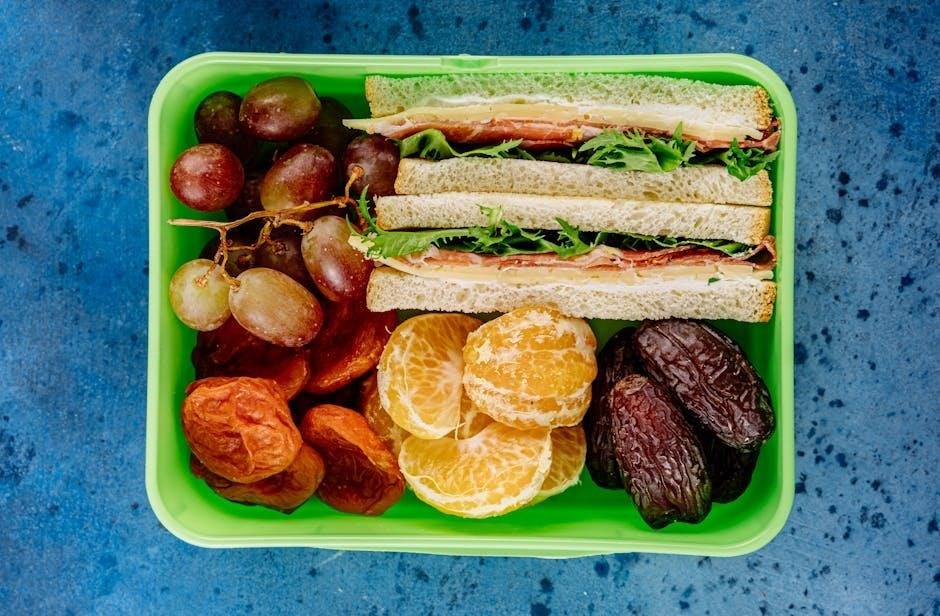A well-structured IVF diet plan enhances fertility and supports reproductive health by guiding essential nutrients, lifestyle adjustments, and providing meal plans for a successful IVF journey;
Importance of Diet in IVF Success
A balanced diet plays a crucial role in improving IVF outcomes by optimizing fertility and reproductive health. Research indicates that nutrient-rich foods enhance ovarian function, egg quality, and embryo development. Antioxidants, omega-3 fatty acids, and essential vitamins support hormonal balance and reduce inflammation. A healthy diet also aids in weight management, which is vital for fertility, as excess weight can negatively impact IVF success. Furthermore, avoiding harmful foods like processed items and excessive caffeine can reduce potential risks. By fueling the body with the right nutrients, individuals undergoing IVF can create a favorable environment for conception and improve their chances of a successful pregnancy. A well-planned diet is a cornerstone of IVF preparation and success.
Overview of the IVF Diet Plan PDF
The IVF Diet Plan PDF is a comprehensive guide designed to support individuals undergoing fertility treatments. It provides detailed meal plans, recipes, and nutritional advice tailored to enhance fertility and improve IVF outcomes. The document typically includes a structured weekly plan with options for breakfast, lunch, dinner, snacks, and beverages, ensuring a balanced intake of essential nutrients. Many PDFs also offer grocery lists, batch cooking tips, and customizable templates to simplify meal preparation. Additionally, they often include information on foods to avoid, lifestyle tips, and supplements that support reproductive health. These resources are created by fertility experts and nutritionists to help individuals make informed dietary choices, ultimately optimizing their chances of IVF success. The PDF format makes it easy to access and follow the plan at home.

Key Components of an Effective IVF Diet
A successful IVF diet focuses on balanced nutrition, whole foods, and hydration, while avoiding processed sugars, alcohol, and caffeine to optimize fertility and overall health.
Essential Nutrients for Fertility
A nutrient-rich diet is crucial for fertility, focusing on antioxidants, omega-3 fatty acids, and essential vitamins like folate and zinc. Foods high in selenium, such as Brazil nuts, support reproductive health, while leafy greens provide iron and calcium. Protein from lean sources like fish and eggs, along with whole grains, ensures proper hormone regulation. Healthy fats, including avocados and olive oil, aid in hormone production. Staying hydrated with water and herbal teas is also vital. Avoiding alcohol, caffeine, and processed sugars helps maintain optimal fertility. These nutrients support egg and sperm quality, improving IVF success rates and overall reproductive well-being.
Foods to Include and Avoid
Focus on whole, nutrient-rich foods like fruits, vegetables, whole grains, and lean proteins to support fertility. Include antioxidant-rich berries, leafy greens for folate, and oily fish for omega-3s. Healthy fats from avocados and nuts, such as Brazil nuts for selenium, are beneficial. Opt for organic options to reduce pesticide exposure. Avoid processed sugars, refined carbohydrates, and trans fats, as they can cause inflammation. Limit alcohol and caffeine, as they may hinder fertility. Reducing red meat and high-sodium foods is also recommended. A balanced diet with fresh ingredients helps regulate hormones and improves IVF outcomes.

Sample IVF Meal Plans
Discover delicious and nutritious meal ideas tailored for IVF success. Includes breakfast, lunch, dinner, and snack recipes, with practical tips for easy preparation and balanced nutrition.
Breakfast, Lunch, and Dinner Recipes
Start your day with nutrient-rich breakfast options like banana-walnut oatmeal, packed with fertility-boosting vitamins and minerals. For lunch, consider grilled chicken salads with mixed greens, avocado, and olive oil, ensuring a balance of protein and healthy fats. Dinner recipes such as baked salmon with quinoa and steamed vegetables provide essential omega-3 fatty acids and fiber. These meals are designed to optimize fertility, support hormonal balance, and energize your body throughout the IVF process. Incorporate colorful, whole foods and avoid processed items to maximize nutritional benefits. Simple, flavorful, and easy-to-prepare, these recipes help you stay on track with your IVF diet plan.
Snacks and Beverages for Fertility
Healthy snacks and beverages play a crucial role in maintaining energy and nutrient balance during your IVF journey. Opt for nuts and seeds, such as almonds, walnuts, and pumpkin seeds, which are rich in healthy fats and minerals like selenium. Fresh fruits like berries, apples, and bananas are excellent choices, providing vitamins and antioxidants. For beverages, consider herbal teas such as peppermint or chamomile for their calming effects. Avoid sugary drinks and excessive caffeine, as they can negatively impact fertility. Incorporate water-rich foods like cucumbers and oranges to stay hydrated. These snacks and beverages not only support fertility but also contribute to overall well-being, keeping you nourished and focused throughout your IVF process.

Role of Supplements in IVF Diet
Supplements enhance fertility by providing essential nutrients, such as folic acid, zinc, and omega-3s, supporting hormonal balance and reproductive health during IVF treatment.
Vitamins and Minerals for Fertility
Essential vitamins and minerals, such as folic acid, zinc, selenium, and omega-3 fatty acids, play a crucial role in enhancing fertility and supporting IVF success. Folic acid prevents birth defects and improves ovarian function, while zinc boosts sperm quality and hormone regulation. Selenium protects eggs and sperm from oxidative damage, and omega-3s reduce inflammation and improve embryo quality. Vitamin D is also vital for hormone balance and reproductive health. Incorporating these nutrients through supplements or a balanced diet can significantly optimize fertility outcomes. Consulting a healthcare provider ensures personalized recommendations for supplementation during IVF treatment.
Herbal Supplements and Their Benefits
Herbal supplements like Maca, Ashwagandha, and Coenzyme Q10 (CoQ10) are widely recommended to support fertility and enhance IVF outcomes. Maca root balances hormones and improves ovarian function, benefiting both men and women. Ashwagandha reduces stress and promotes reproductive health by regulating cortisol levels. CoQ10 boosts egg and sperm quality by enhancing mitochondrial function, particularly in older individuals. These herbs are natural, non-invasive options that complement a fertility-focused diet. However, it’s crucial to consult a healthcare provider before starting any supplement regimen to ensure safety and avoid interactions with medications. Incorporating these herbs can be a valuable addition to your IVF preparation, optimizing both physical and emotional well-being.

Staying on Track with Your IVF Diet
Consistency is key to maximizing IVF success. Plan meals, stay organized, and commit to a balanced diet to maintain focus and achieve optimal fertility health.
Meal Planning and Grocery Tips
Effective meal planning and grocery shopping are essential for maintaining an IVF-friendly diet. Start by creating a weekly meal plan, focusing on balanced and nutrient-rich dishes. Make a detailed grocery list to ensure you have all the necessary ingredients, such as fresh fruits, vegetables, whole grains, lean proteins, and healthy fats. Incorporate fertility-boosting foods like nuts, seeds, and oily fish. Batch cooking can save time and ensure you have healthy meals ready. Avoid processed foods and opt for organic options when possible. Staying organized and prepared helps maintain consistency, reducing stress and supporting your IVF journey. Consider consulting a nutritionist for personalized advice and use resources like the IVF diet plan PDF for guidance.
Batch Cooking for Convenience
Batch cooking is a time-saving strategy that simplifies maintaining an IVF-friendly diet. By preparing meals in advance, you can ensure healthy, nutrient-rich options are always available. Start by dedicating one day a week to cook meals like soups, casseroles, and salads in bulk. Use containers to portion meals for easy reheating, reducing the temptation to rely on less healthy options. Batch cooking also helps reduce stress and saves time during busy weeks. Pair this method with a structured meal plan to stay organized and focused on your fertility goals. Incorporate protein-rich dishes, whole grains, and vibrant vegetables to keep meals balanced and satisfying. This approach ensures consistency and makes adhering to your IVF diet plan more manageable and sustainable;
A structured IVF diet plan plays a pivotal role in optimizing fertility and supporting your reproductive health journey. By focusing on nutrient-rich foods, balanced meals, and sustainable lifestyle changes, you can enhance your chances of IVF success and build a strong foundation for a healthy pregnancy. Stay committed, and let your dietary choices be a cornerstone of your path to parenthood.
Final Tips for IVF Diet Success
Consistency is key—stick to your IVF diet plan and avoid deviations to maximize benefits. Incorporate fertility-boosting foods like leafy greens, berries, and omega-3 rich fish into meals. Hydrate adequately with water and herbal teas, avoiding sugary drinks. Limit processed foods and opt for whole, nutrient-dense options. Consider meal prepping to maintain healthy eating habits during busy times. Don’t forget to include nuts and seeds, which are packed with essential vitamins and minerals. Pair diet with regular physical activity for overall well-being. Seek professional guidance to tailor your plan to specific needs. Remember, a balanced diet is just one piece of the puzzle, but it plays a significant role in supporting your IVF journey and improving chances of success.
